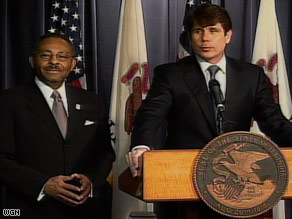Analysis: Constitutional fight looms over Senate seat
- Story Highlights
- Conflicting Constitution passages complicate fight over Roland Burris' appointment
- Senators say they have authority to reject Illinois Gov. Blagojevich's pick
- Senators cite allegations that Blagojevich tried to sell seat
- Fight over appointment may go to Supreme Court
- Next Article in Politics »
CNN Supreme Court Producer
The U.S. Senate is considered the most exclusive legislative body in the country, and members of its majority say they will not accept Roland Burris -- tapped by embattled Illinois Gov. Rod Blagojevich to fill a vacant seat -- into their own.

Illinois Gov. Rod Blagojevich, right, has named Roland Burris to fill President-elect Barack Obama's Senate seat.
Conflicting passages in the Constitution complicate a legal and political fight, with the Supreme Court as the possible final word. A 1969 high court ruling could ultimately decide who fills the seat recently vacated by the president-elect.
Democrats in the Senate have twice this week said they have the authority to refuse to accept "anyone appointed by Gov. Blagojevich" to fill the seat once held by Obama.
Blagojevich was arrested December 9, accused by federal authorities of corruption by allegedly trying to sell Obama's seat for personal, political and financial gain. Blagojevich, a Democrat, has denied the charges, and this week named Burris, a former Illinois attorney general, to the post.
Burris said he is prepared to present his credentials to Senate officials next week.
"The governor has the constitutional and statutory authority to make the appointment," he said Wednesday. "We are certainly going to make contact with the leadership of the Senate to let them know that the governor of Illinois has made a legal appointment, and that I am currently the junior senator for the state of Illinois."
A legal fight is already under way, with Illinois Secretary of State Jesse White refusing to certify the appointment. Burris' attorneys responded by filing paperwork with the state's highest court. Burris promised to show up in person to the Senate Tuesday, when new members are sworn in, but Democratic leaders said he would be turned away, at least until the issue is resolved.
Senate sources said Democratic officials and their staff spent the New Year's holiday dusting off legal and legislative precedents for guidance about how to proceed. Watch efforts to keep Burris from the Senate ![]()
Don't Miss
Article 1, Section 5 of the Constitution gives Congress the power to be "judge of the elections, returns and qualifications of its own members." Democratic senators in recent days have cited that provision when asserting "our Constitutional authority" without further explanation.
But Article 1, Section 3 lists those qualifications: "No person shall be senator who shall not have attained to the age of 30 years, and been nine years a citizen of the United States." The potential senator must also be an inhabitant of the state from which he or she is chosen. Burris, 71 and a lifelong Illinoisan, certainly meets all those requirements.
Senate Democrats chose to focus not on the individual qualifications, but on the process used to select the nominee and the person making that choice.
"This is not about Mr. Burris," said a statement from Senate leaders Tuesday. "It is about the integrity of a governor accused of attempting to sell this United States Senate seat."
Senate leadership spokesman Jim Manley added: "We are not making a judgment about the qualifications of the appointee, but about whether the appointment itself was tainted by fraud. We believe we are entitled to do that. This is like judging the integrity of an election, free from fraud and corruption."
Seating Obama's replacement could take months while the issue moves up the legal food chain in state and federal courts.
In 1967, the House of Representatives refused to seat longtime Rep. Adam Clayton Powell, D-New York, amid a corruption investigation. The Supreme Court ultimately intervened two years later with a simple ruling: "The House is without power to exclude any member-elect who meets the Constitution's requirements for membership."
There is a significant difference between the Illinois vacancy and the 40-year-old case: The Powell case dealt with an elected member, as opposed to a temporary gubernatorial appointment. Courts could now be asked to decide whether the Senate's power to seat its members is the same for those elected or appointed. And, does the Senate have the authority to essentially override a state's selection process in an effort to preserve the integrity of the entire legislative body?
Illinois law clearly gives the governor the sole power to select someone like Burris, whose professional resume is extensive and by all accounts spotless. The state's supreme court on December 17 refused to consider legal challenges made by Illinois Attorney General Lisa Madigan trying to blunt Blagojevich's authority. Days later, the governor named Burris to the Senate seat.
In sensitive matters involving individual members of the legislative and executive bodies, the federal courts have been generally deferential to the other branches of government to essentially police their own.
There is no certainty whether the Supreme Court, if asked to intervene in the Illinois controversy, would draw distinctions between the criteria the Senate would use for elected versus appointed members, between qualifications and integrity. Having judges sort out that contrast between the person and the process would be a time-consuming, complex process.

The justices of the Supreme Court may ultimately decide not to rule on whether Burris' appointment would "taint" the Senate, concluding that such questions on the process -- not the person -- would be a political question, not a legal one.
And unforeseen events, such as the pending indictment of Blagojevich and any decision about whether he should resign, could ultimately affect this unusual showdown of political, legislative and constitutional prerogatives.
All About Rod Blagojevich • Illinois • Roland Burris • U.S. Senate

 Sit tight, we're getting to the good stuff
Sit tight, we're getting to the good stuff